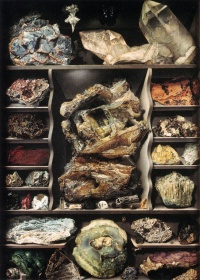Chemistry
From The Art and Popular Culture Encyclopedia

|
""Better things for better living … through chemistry" was a Dupont advertising slogan that ran from 1935 until 1982."--Sholem Stein "No nation so ancient, but has had its narcotic soother from the most ancient times; none so remote or isolated but has found within its own borders a pain-allayer or narcotic pain-dispeller." -- Chemistry of Common Life (1855) by James Finlay Weir Johnston |
|
Related e |
|
Featured: |
The branch of science that deals with the composition and constitution of substances and the changes that they undergo as a consequence of alterations in the constitution of their molecules. Metaphorically, also used for the mutual attraction between two people; rapport, affinity.
History
By 1000 BC, ancient civilizations used technologies that would eventually form the basis of the various branches of chemistry. Examples include extracting metals from ores, making pottery and glazes, fermenting beer and wine, making pigments for cosmetics and painting, extracting chemicals from plants for medicine and perfume, making cheese, dying cloth, tanning leather, rendering fat into soap, making glass, and making alloys like bronze.
Early attempts to explain the nature of matter and its transformations failed. The protoscience of chemistry, Alchemy, was also unsuccessful in explaining the nature of matter. However, by performing experiments and recording the results the alchemist set the stage for modern chemistry. This distinction begins to emerge when a clear differentiation was made between chemistry and alchemy by Robert Boyle in his work The Sceptical Chymist (1661). Chemistry then becomes a full-fledged science when Antoine Lavoisier develops his law of conservation of mass, which demands careful measurements and quantitative observations of chemical phenomena. So, while both alchemy and chemistry are concerned with the nature of matter and its transformations, it is only the chemists who apply the scientific method. The history of chemistry is intertwined with the history of thermodynamics, especially through the work of Willard Gibbs.
See also
- Skatole
- Alchemy
- Better Living Through Chemistry
- Multiple chemical sensitivity
- Elective Affinities an 1809 novel by Johann Wolfgang von Goethe

